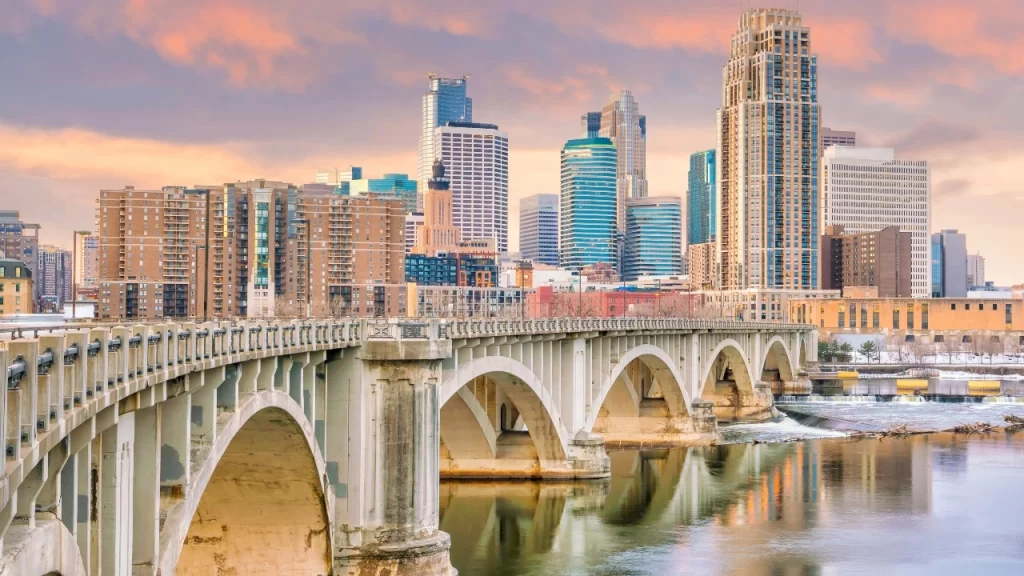Minnesota Gov. Tim Walz will sign an adult-use marijuana legalization bill into law that also allows cannabis companies to sell hemp-derived products including those that contain delta-8 THC.
When the governor does, Minnesota will become the 23rd state to legalize adult-use cannabis in the United States and the second to do so in 2023 after Delaware.
State lawmakers, whose regular legislative session ends Monday, voted early Saturday morning to give final approval to a cannabis legalization bill that first passed both chambers of the Legislature in late April after nearly six months of lengthy hearings.
That bill now heads to Walz’s desk.
Once Walz signs, adults 21 and older will be able to consume and cultivate small amounts of cannabis at home beginning Aug. 1.
Sales at retail dispensaries, subject to a 10% tax, won’t begin for another year.
Retailers are limited to no more than five locations, and cultivation licensees will be capped at 15,000 square feet of canopy.
Vertical integration will be allowed, but only for small businesses or businesses that deal only in low-THC hemp-derived products.
‘Mezzobusinesses’ and delta-8
Licenses for both microbusinesses and what the state calls a “mezzobusiness” will be issued. Those permits will allow a holder to cultivate and process as well as sell at up to one location for microbusinesses and three for a mezzobusiness.
Mezzobusinesses will be allowed to cultivate, manufacture and sell products derived from low-THC hemp.
They are also allowed to work with synthetic cannabinoids such as delta-8 THC.
When awarding licenses, regulators can give preference to social equity applicants, including veterans as well as people from impoverished communities or communities disproportionately affected by the war on drugs.
There is no statewide license cap for future holders of one of a dozen new marijuana business licenses.
However, local governments do have the authority to limit retailers to one license per 12,500 residents – a generous allowance compared to other states – and to enact strict zoning controls.
One of the country’s more restrictive states for medical marijuana, Minnesota currently has 15 MMJ dispensaries, according to state data.
Only two companies, both multistate operators, are licensed to operate in the state: Chicago-based Green Thumb Industries, which sells cannabis in Minnesota under its Rise brand, and Minneapolis-headquartered Goodness Growth, formerly known as Vireo Health.
Along with gun control and a bill guaranteeing minimum wage for gig workers, marijuana legalization was one of many legislative priorities for the Democratic Farmer-Labor (DFL) party, the state affiliate of the national Democratic Party.
The DFL assumed control of the state Senate in November.
Cannabis reform is now part of the standard platform for most mainstream Democrats, but Minnesota had additional impetus to legalize adult-use cannabis.
New restraints on delta-8, delta-9 THC
A law passed at the deadline last year allowed hemp-derived intoxicating cannabinoids to be sold statewide at grocery and convenience stores.
This includes controversial delta-8 THC, which remains a popular alternative in prohibition markets despite a wave of states passing tough regulations or outright bans, as well as hemp-derived delta-9 THC.
The opiate-overdose crisis also played a role, as Walz told CNN on Sunday.
The bill explicitly permits retailers to sell products that detect the presence of fentanyl, the synthetic opioid responsible for most of the country’s drug-overdose deaths, according to the Centers for Disease Control and Prevention (CDC).
As many as 109,000 Americans died from drug overdoses in 2022, according to the CDC.
The legalization bill has protections for the existing medical marijuana and hemp industries, sponsors promised.
Green Thumb and Goodness Growth will be allowed to sell adult-use marijuana “based on the percentage of their business lost to newly licensed recreational cannabis retailers,” according to the Minnesota state House.
Critics have said that the bill gives an unfair advantage to the two MSOs, which, as existing operators, can cultivate cannabis well in excess of the 15,000-square-foot limit to be imposed on new applicants.

